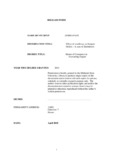Please use this identifier to cite or link to this item:
https://cris.library.msu.ac.zw//handle/11408/3887Full metadata record
| DC Field | Value | Language |
|---|---|---|
| dc.contributor.author | Gosha, Paul | - |
| dc.date.accessioned | 2020-11-19T12:34:44Z | - |
| dc.date.available | 2020-11-19T12:34:44Z | - |
| dc.date.issued | 2018 | - |
| dc.identifier.uri | http://hdl.handle.net/11408/3887 | - |
| dc.description.abstract | The objective of this research was to establish the effect of net wealth tax on public deficit in Zimbabwe since the country’s budget deficit is growing from 2014 up to the present day. The main thrust was put on the effect of wealth distribution on public deficit, effect of wealth valuation on public deficit, the effect of wealth tax unit on public deficit, effect of wealth tax administration on public deficit, effect of wealth tax efficiency on public deficit and finally the effect of wealth tax challenges on public deficit. A survey was carried out from a sample in Harare where respondents from the two stratums that is the low density and the high density were randomly chosen. The respondents indicated their views on the questionnaires and the majority of the respondents agreed that there is unequal wealth distribution in Zimbabwe. The respondents also agreed that the distribution of wealth have an effect on the budget deficit of the country. The relationship between wealth valuations to budget deficit was viewed by the respondents to be in existence. The research findings also established that wealth tax unit has an impact on public deficit in Zimbabwe. From the respondents’ views, the relationship between wealth tax administration and budget deficit was found to be positive. On wealth tax efficiency mixed views were obtained and the generality of the respondents indicated that there is a negative relationship between wealth tax administration and budget deficit. The government can use the results from this research to implement the net wealth tax since the majority of the respondents agreed that net wealth tax is a good policy and that the benefits derived from its implementation outweigh the disadvantages. The research centered on the effect on net wealth on budget deficit only. Future research on the effect of wealth tax in reducing inequality need to be looked at since the country is faced with unequal distribution of wealth. | en_US |
| dc.language.iso | en | en_US |
| dc.publisher | Midlands State University | en_US |
| dc.subject | wealth tax | en_US |
| dc.subject | budget deficit | en_US |
| dc.title | Effect of wealth tax on budget deficit :a case of Zimbabwe | en_US |
| dc.type | Thesis | en_US |
| item.grantfulltext | open | - |
| item.openairetype | Thesis | - |
| item.languageiso639-1 | en | - |
| item.fulltext | With Fulltext | - |
| item.openairecristype | http://purl.org/coar/resource_type/c_18cf | - |
| item.cerifentitytype | Publications | - |
| Appears in Collections: | Master Of Commerce In Accounting Degree | |
Files in This Item:
| File | Description | Size | Format | |
|---|---|---|---|---|
| gosha paul.pdf | Full Text | 1.25 MB | Adobe PDF |  View/Open |
Page view(s)
276
checked on Jan 11, 2026
Download(s)
370
checked on Jan 11, 2026
Google ScholarTM
Check
Items in MSUIR are protected by copyright, with all rights reserved, unless otherwise indicated.



